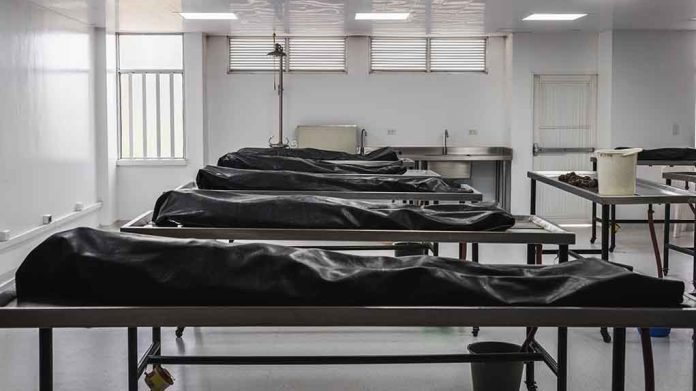
Israeli airstrikes on suspected Syrian chemical weapons facility leave 25 dead, escalating regional tensions.
At a Glance
- Israeli jets struck targets in Syria, including a military research center in Masyaf.
- At least 25 people killed, including civilians and pro-Iranian militia members.
- Strikes aimed at preventing chemical weapons development and Iranian entrenchment.
- Syrian air defenses intercepted some missiles, but significant damage reported.
- Attack comes amid heightened regional tensions following Hamas-Israel conflict.
Israeli Airstrikes Target Syrian Military Research Center
In a significant military operation, Israeli jets launched a series of airstrikes on targets in Syria, resulting in at least 25 fatalities. The main target was a military research center in Masyaf, believed to be associated with Syria’s chemical and ballistic missiles program. The strikes, which occurred around 23:20 local time on Sunday, also caused explosions in Damascus, Homs, and Tartus.
The UK-based Syrian Observatory for Human Rights, an opposition war monitor, described the attack as one of the most violent Israeli strikes in Syria in years. According to their report, the casualties included five civilians, four Syrian soldiers, and 13 individuals working with pro-Iranian groups. The observatory stated that the strikes targeted the scientific research area in Masyaf, destroying buildings and military centers.
"2 regional intelligence sources": #Israel strikes hit #Assad regime's main facility for conventional and chemical weapons several times
Center hosted team of #Iran military experts involved in weapons production
Unconfirmed claims: 14-missile attack killed 25 people#Syria https://t.co/TaA21OiZ6K
— Scott Lucas (@ScottLucas_EA) September 9, 2024
Syria’s Response and International Reactions
Syrian state media reported that their air defense systems intercepted some of the incoming missiles. However, the attacks still caused significant damage to water and electricity infrastructure. The Syrian foreign ministry strongly condemned the strikes, labeling them as blatant aggression. Meanwhile, the Iranian foreign ministry also denounced the attack, highlighting the complex web of alliances in the region.
The international community is closely watching these developments, as they come at a time of heightened tensions following the recent assassination of Hamas chief Ismail Haniyeh in Tehran. This event has further complicated the already volatile situation in the Middle East.
Israel’s Strategic Objectives
Israel’s actions in Syria are part of a broader strategy to ensure its national security and prevent the development of weapons that could pose an existential threat. The Masyaf facility had been previously targeted by Israel in 2017, suspected of storing short-range surface-to-surface missiles and chemical munitions. This latest strike underscores Israel’s ongoing efforts to disrupt what it perceives as dangerous weapons development programs in neighboring countries.
“Officers from forces in the area working in the Scientific Research Centre confirmed to SOHR that the center is unrelated to chemical weapons and that officers from the Iranian ‘Revolutionary Guard’ have been present there for six years in the framework of developing short- and medium-range precision missiles, and during the current year, the line of developing drones joined it,” the Syrian Observatory for Human Rights added.
Furthermore, these strikes aim to prevent Iranian entrenchment in Syria, which Israel views as a key route for Iran to send weapons to Hezbollah in Lebanon. The presence of Iranian experts reportedly developing precision missiles and drones in Masyaf has been a particular concern for Israeli defense officials.
Regional Implications and Future Outlook
This latest Israeli operation in Syria highlights the precarious balance of power in the Middle East. It comes at a time when the region is already grappling with the aftermath of the Hamas-Israel conflict, which began with the October 7 attacks by Hamas on Israeli civilians and soldiers. Since then, Israeli raids on Iranian-backed militia targets in Syria have surged, indicating an escalation in the shadow war between Israel and Iran.
As tensions continue to simmer, the international community faces the challenge of addressing these complex security issues while preventing further escalation. The moral and ethical dilemmas of military intervention in such a volatile region remain at the forefront of diplomatic discussions. Moving forward, there is an urgent need for international dialogue and policy-making to address the existential threats posed by chemical weapons and other advanced military technologies in the hands of hostile actors.
Sources:
- Israeli strikes in Syria kill at least 25, war monitor says
- Israeli attack kills at least 18 people in central Syria: Health minister
- Airstrikes hit Syrian facility that West alleged produced chemical weapons, eyewitness says
- Israel Strikes Scientific Research Center in Central Syria
- Airstrikes Hit Syrian City Said to Be a Weapons Research Hub, Killing 18
- Most extensive since war on Gaza | 25 people killed as result of rounds of Israeli strikes on Scientific Research Centre and five other targets in Hama countryside
- 25 dead in strike on chemical weapon center in Syria
- Civilians among at least 18 killed in Israeli airstrikes on Syria















